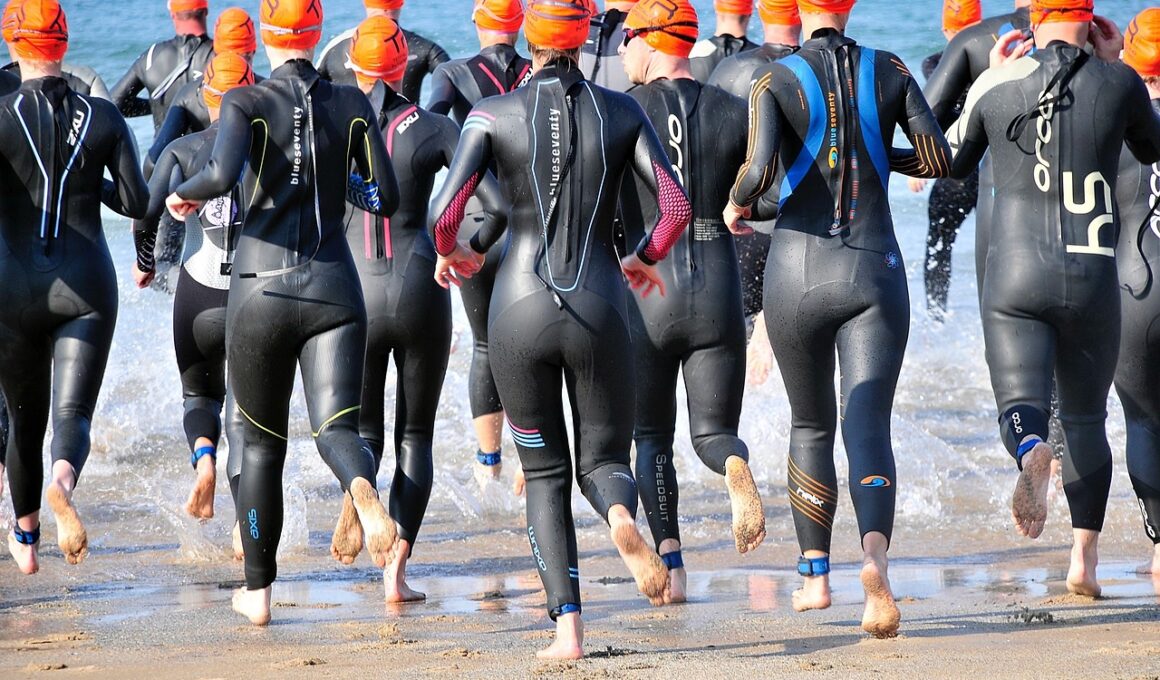How to Prepare Mentally for Your First Olympic Triathlon
Embarking on the journey of your first Olympic triathlon can be both exhilarating and daunting. Mental preparation is just as crucial as physical training. Whether you’re a seasoned athlete or a novice, understanding the mental aspects helps in managing anxiety and enhancing performance. Begin by establishing clear goals, such as finishing the race, achieving a specific time, or simply enjoying the experience. Visualization techniques can aid in this process. Picture yourself crossing the finish line, feeling accomplished and proud. Visualization not only helps in reducing pre-race nerves but also builds confidence as you mentally rehearse your performance. Incorporating regular mental training sessions into your routine will further prepare you mentally for race day. Set aside time to focus solely on your mental strategies; consider journaling your thoughts and feelings about the race. Utilize mindfulness and meditation practices to stay present in the moment, which can significantly reduce anxiety. Remember to trust your training and maintain a positive mindset throughout your preparation and on race day. Your mental strength will be a key factor in successfully completing your Olympic triathlon.
The Role of Visualization in Triathlon Training
Visualization has become a powerful tool in the competitive world of endurance sports. Athletes utilize this technique to enhance mental toughness and overall performance. Start by finding a quiet space, closing your eyes, and imagining every detail of the race. Visualize the transition areas, the crowd’s excitement, and the sound of your own breath during the swim, bike, and run legs. Visualizing positive outcomes induces a sense of familiarity, reducing anxiety as race day approaches. Make it a routine practice, dedicating short bursts of time each week specifically to visualization. This technique enables you to mentally rehearse the moments you may find challenging, such as transitions. Through repeated mental practice, your body learns how to respond during those situations, guiding you to stay calm and focused. Remember to engage all your senses. Imagine the taste of energy gels, the feel of the bike handlebars, and the sound of cheering spectators. This sharper imagery enhances your neural pathways, linking sight and behavior. By harnessing the power of visualization, you can cultivate a positive mindset and boost your confidence for race day.
Another essential component of mental preparation is understanding anxiety management during training and competition. Feelings of nervousness are entirely normal, and it’s crucial to channel that anxiety into positive energy. One effective way to do this is through breathing exercises. Deep breathing techniques can help calm your mind and reduce the physical symptoms of anxiety, such as increased heart rate and muscle tension. Practicing these techniques during your training can prepare you for the heightened emotions you might experience on race day. Consider establishing a pre-race routine that includes focusing on your breath, grounding exercises, or light stretching, which can serve to center you and alleviate stress. Furthermore, discussing your concerns with fellow athletes or a coach can help normalize your feelings. Lastly, embrace the possibility of imperfection; no race goes exactly as planned, and that’s okay. Accepting the outcome, regardless of whether it meets your expectations, enables you to experience the event fully. Remember, it’s a journey, and learning from every race will contribute to your development as an athlete.
Building Mental Resilience Through Positive Self-Talk
Positive self-talk can significantly improve not only your mental preparation but also your race-day performance. The dialogues we have with ourselves shape our mindset and can make or break our self-belief. Begin by identifying and transforming negative thoughts into positive affirmations. For example, instead of thinking, “I don’t know if I can finish,” practice saying, “I am strong, and I am capable of finishing this race.” Keep these affirmations simple, memorable, and aligned with your goals for the race. Feel free to write them down, creating visual reminders to help foster positivity. Incorporate these mantras into your training sessions, repeating them during tougher workouts. As race day approaches, remind yourself of moments you’ve trained hard, achieved personal goals, and overcome obstacles. This reflection can reinforce your capabilities and fortify your resolve. Additionally, surround yourself with supportive individuals who uplift and encourage you. Their positive energy will help counterbalance any self-doubt. Remember, mental resilience is about bouncing back from setbacks and using them as motivation to keep pushing forward.
Another significant aspect of mental preparation is developing effective coping strategies for race day. Unexpected challenges may arise, from adverse weather conditions to physical setbacks, and it’s essential to be equipped with plans to handle them. One effective strategy is to create a mental toolkit comprising various coping techniques. Include mindfulness practices, breathing exercises, or simply having a motivational playlist ready to go on race day. By pre-emptively addressing your concerns, you will feel more focused and confident. Planning for potential challenges allows you to remain flexible, which is crucial when adapting to the day’s circumstances. Think through various scenarios: what will you do if you have a flat tire on the bike or feel fatigued during the run? Having these plans in place equips you with the confidence to handle adversity effectively. Additionally, implementation of a steadfast mantra can guide you and help maintain focus throughout the race. Continually remind yourself of your goals and what matters most to you as you race. This mental preparation will cultivate resilience, whether during training or in competition.
Post-Race Reflection and Learning
Post-race reflection is an invaluable part of the overall preparation process. After crossing the finish line, take some time to process your experience and evaluate your performance. Write down your thoughts in a journal, noting what went well and what could be improved for the future. Consider aspects such as your nutrition, pacing, and mental state during the race. Reflecting on your thoughts and feelings can shed light on your mental preparation strategies. Take this moment to celebrate your achievements, regardless of your finish time. Acknowledge the effort you put into training and the courage it took to participate. Consider seeking feedback from coaches or fellow athletes about your performance to gain additional perspectives. Discussing your race experience can reinforce lessons learned and highlight areas for growth. This practice not only enhances your development as an athlete but also boosts your overall satisfaction with the journey. Furthermore, view each race as a stepping stone in your long-term athletic journey, preparing you not just for your next triathlon but for a lifetime of challenge and accomplishment.
To successfully prepare mentally for your first Olympic triathlon, integrating these strategies into your training routine is key. Start developing mental stamina early in your training cycles as you build your physical foundation. Incorporate visualization of the race, self-affirmation, and mindfulness practices regularly, ensuring they become part of your routine. Embrace the psychological aspects as much as the physical training, as both are interlinked in triathlon. Work on your confidence, resilience, and adaptability to manage the pressures that come with race day. Typically, athletes focus heavily on physical attributes; mental preparation is equally vital and can enhance performance tremendously. Lastly, remember that every athlete’s journey is unique. Find what works for you in terms of mental conditioning and practice it diligently. Whether through visualization, self-talk, or coping strategies, these tools will shape your overall experience for the better. Keep experimenting with methods that resonate with you as you progress in the triathlon world. Ultimately, the aim is to enjoy the experience while building the mental fortitude that will serve you well beyond your first Olympic triathlon.


